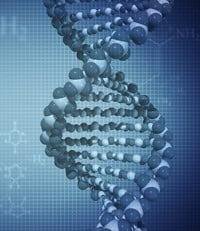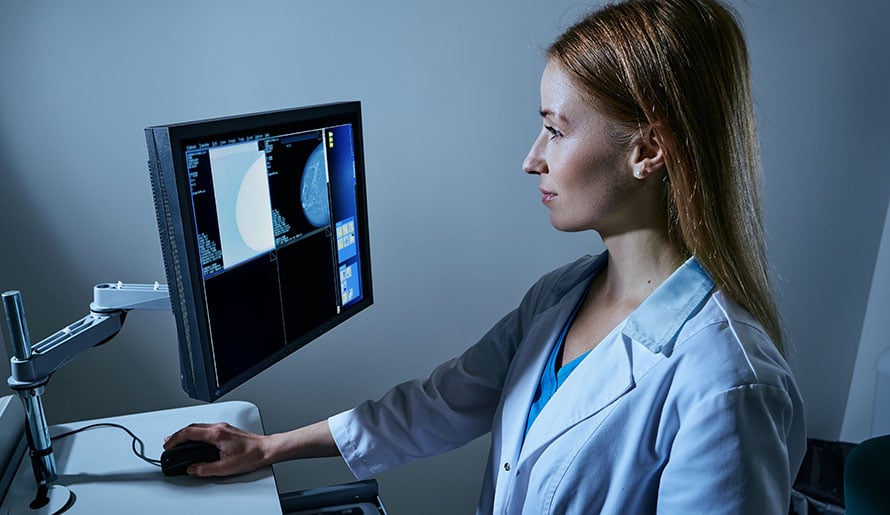Breast Cancer Causes and Risk Factors
Breast cancer occurs when healthy breast tissue cells undergo abnormal DNA changes that cause them to grow and divide uncontrollably. The excess cells then build up, bind together and form tumors.
-
1 in 8
Women in the US will be diagnosed with breast cancer.
Currently, one in eight American women will be diagnosed with breast cancer at some point during her life. Men are affected, too, though much less frequently. With that said, breast cancer cases have been steadily declining since the early 1990s. Experts attribute this positive trend to several factors, including increased awareness, improved screening, early detection and continually expanding treatment options.
What causes breast cancer?
Although scientists do not yet fully understand the precise causes of breast cancer, they have confirmed that healthy breast cells can become cancerous due to gene mutations. Made of DNA inherited from both parents, genes control all aspects of cellular function and provide instructions for when a cell should grow, divide and die. Usually, breast cancer results from changes in several different genes, and approximately 90% of cases r

esult from acquired—not inherited—gene mutations that have not yet been identified by scientists.
The other 10% of breast cancer cases are linked to known gene mutations th
at are passed from parent to child, such as a harmful change in breast cancer gene 1 (BRCA1) or breast cancer gene 2 (BRCA2). BRCA1 and BRCA2 are tumor suppressor genes that prevent excessive cell growth and produce proteins to help repair damaged DNA.
Although many people who inherit a mutation in the BRCA1 or BRCA2 gene develop breast cancer, scientists believe the gene mutation is likely just one of many factors—including certain environmental exposures and lifestyle practices—that contribute to the development of cancer.
Breast cancer risk factors
Scientists have conclusively identified several risk factors that increase the chance of developing breast cancer. However, having a risk factor—or even several—does not always lead to cancer. Certain breast cancer risk factors, such as age and inherited gene mutations, cannot be controlled. Others, such as diet and exercise, relate to personal choices that can be controlled.

In addition to inherited mutations to certain genes, such as BRCA1 and BRAC2, some known breast cancer risk factors include:
- Advanced age – Breast cancer risk increases with time, and most cases are diagnosed after age 50.
- Exposure to hormones – Certain breast cancers grow in response to hormones. Women who begin menstruating early (before age 12) or enter menopause late (after age 55) have prolonged exposure to estrogen and progesterone.
- Dense breasts – A common mammogram finding, dense breast tissue has more connective and glandular tissue than fatty tissue, which can complicate the breast cancer screening process by obscuring tumors in the resulting images.
- A personal history of breast cancer or a benign breast condition – Breast cancer can recur, and noncancerous conditions such as atypical hyperplasia and lobular carcinoma in situ can sometimes progress into cancer.
- A family history of breast or ovarian cancer – A woman has a heightened risk of breast cancer if she has a first-degree relative (mother, sister or daughter) or several family members who were diagnosed with breast or ovarian cancer.
- Prior radiation therapy – Women who have had radiation treatment delivered to their chest or breasts before age 30 have an increased risk of developing breast cancer.
- Exposure to diethylstilbestrol (DES) – Between 1940 and 1971, DES was routinely prescribed to pregnant women in the United States to help prevent miscarriage. A woman who took DES, or whose mother took DES while pregnant, has a higher risk of developing breast cancer.
- Pregnancy – Women who have never carried a pregnancy to term and women who delivered their first child after age 30 have an increased risk of breast cancer.
Finally, smoking and other forms of tobacco use, excessive consumption of alcoholic beverages and excess body weight are well-established risk factors for many types of cancer, including breast cancer.
Breast cancer prevention
Because some breast cancer risk factors can be controlled, there are several preventive steps a woman can take to help manage her risk. For example, many experts believe that physical activity performed at a moderate to intense level for four to seven hours per week can lower the risk of breast cancer. A healthy diet is also beneficial; poor nutrition or a diet low in fruits and vegetables is thought to contribute to the development of up to 40% of cancers, including breast cancer. Finally, by exercising regularly and eating a nutritious diet, a woman can achieve and maintain a healthy body weight. This is important because overweight and obese women are more likely to be diagnosed with breast cancer, especially after menopause.
When detected at an early stage, breast cancer is highly treatable. Therefore, every woman should be regularly screened in the manner and at the frequency recommended by her clinical care provider. According to many experts, the routine use of mammograms and other types of screening radiology has reduced breast cancer mortality in the United States by nearly 40% since 1990.
Benefit from world-class care at Moffitt Cancer Center
As a National Cancer Institute-designated Comprehensive Cancer Center, Moffitt plays a pivotal role in breast cancer research. With a robust portfolio of clinical trials, we are making great strides in understanding breast cancer and developing effective new ways to prevent, diagnose and treat it.
To help women who have multiple breast cancer risk factors better understand their risk level and their options for managing it, Moffitt is pleased to offer an advanced genetic counseling and testing service. Through our renowned Don & Erika Wallace Comprehensive Breast Program, our patients can benefit from individualized advice, screening, treatment, support and multiple expert opinions in a single, convenient location.
If you would like to learn more about breast cancer causes and risk factors, you are encouraged to talk with a specialist at Moffitt. To request an appointment, call 1-888-663-3488 or submit a new patient registration form online. We do not require referrals.
Diagnosis
